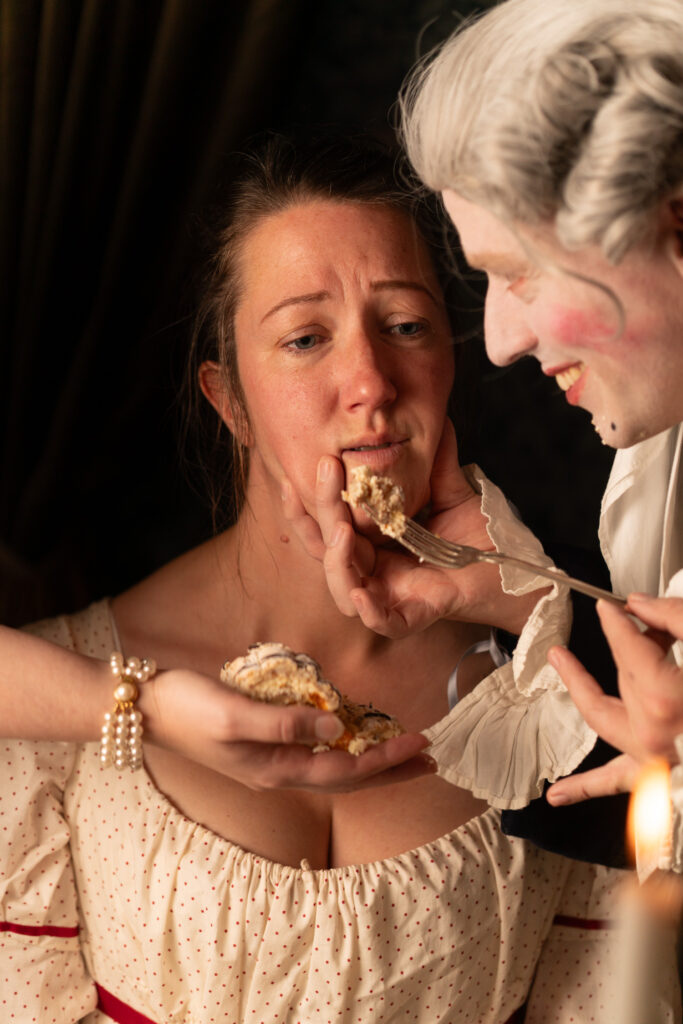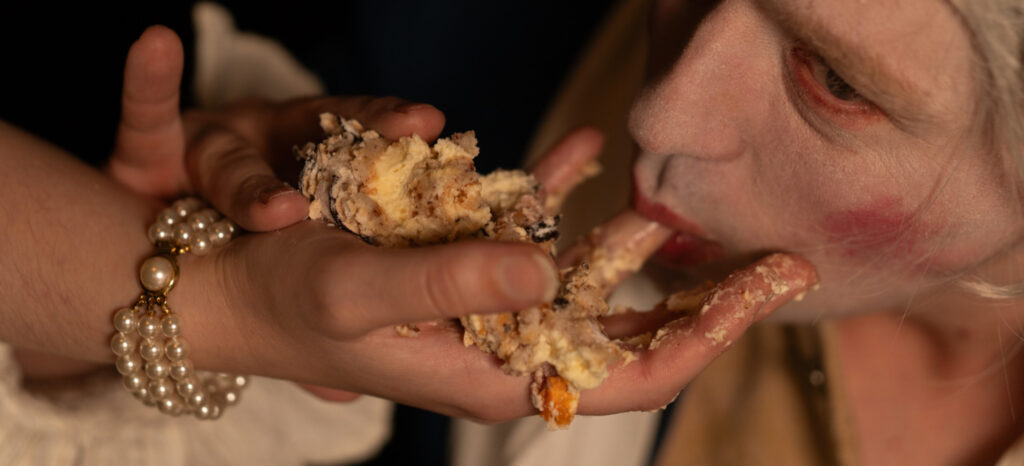Characters are divided into three different character groups (Gentry, Guests, and Servants). In addition to this, we will offer a few different archetypes to choose from, to make casting easier. In this page, you can read about both groups and archetypes.
Character groups

Gentry
The gentry are a group of friends and acquaintances from the aristocracy, bound together by their libertine philosophy. They have a shared history of decadent excesses and debauched parties. Over time, they have grown bored of only the company of fellow libertines and denizens of low places. They want new sport – people with social standing, morals, breeding.
People with something to lose. And of course, being of the gentry class, still in possession of wealth, privilege and favours to bestow, they will never be short of people willing to be drawn in.
When playing as a gentry character, you will have some responsibility for creating and distributing play, and creating oppression. You should not, however, see yourself as an NPC, but will have your own story.
Servants
Usually, servants have very little agency and autonomy, and live at the whim of their masters, to be abused or discarded as they see fit. The work is ceaseless, as is the subservience. But at the Mander feast, things will be different. The household staff are used to act as enforcers in the hosts’ cruel games, doing things that a servant would otherwise never get away with.

Any visiting servants will pressganged into participating in these acts. Some may struggle and balk at the things they are forced to do. Some may relish in the opportunity to finally put themselves above the people that they are normally required to bow and scrape for. But regardless of if they are eager or unwilling to participate, none will completely refuse – because they know that beneath it all, the power is only given them as a pretense, and who is really calling the shots.
When playing as a servant character, you do not have to work for the larp to function. However, it is recommended that you enjoy working as a part of your larp experience, as well as playing on the dynamic between master and servant. During the later parts of the game your experience will be focusing on being part of the gentry’s immoral games – quite often as perpetrators. You will be playing closely with the NPC servants, who will be in-game and active in play.

Guests
The guests are people from the upper middle classes who have been invited to the Manders’ party. They are all acquainted with one or more of the gentry characters, but they do not know about their true nature, or understand what kind of experience they are in for. Instead, they are all elated and hopeful to be invited to socialise on such intimate terms with the privileged and wealthy.
They all have their own hopes of what they might achieve during their stay – favours promised, deals made, perhaps even an engagement.
Although the guests are by no means perfectly innocent, and all have their own flaws, their lives are positively virtuous when compared to the gentry that have invited them. During the course of their stay, some may become increasingly inclined to follow their darker nature – if only to protect themselves from the worst of the cruelty by directing it at someone else.
When playing as a guest character, you will become the victim of oppression from the gentry, and by extension the servants. It may be possible for your character to claw their way up to a more privileged situation by oppressing others, but they will never be able to be truly in control. Whatever power they have is given by the gentry, and can as quickly be taken away.

Character archetypes
In the sign-up, you will choose between archetypes, to give us an estimated understanding of what type of character you would most like to play, and make casting easier. You can select several archetypes you are interested in. Almost all archetypes work for all character groups, but will of course work a little differently depending on which group they are in. It should also be noted that the archetypes speak more about who your character will be at the Mander party, than who they are in everyday life.
The archetypes are as follows:
Controlling Tormentors
These characters routinely control others. Some control just one or a few people, driven by feelings of jealousy, responsibility or ownership. Others simply see everyone as a plaything, to be poked and prodded for their amusement.
Privileged Bon-Vivants
These characters do what they want, because they want it, and rarely stop to think how their actions affect those around them. In some cases, perhaps circumstances are not so severe – in other cases, they might ruin lives and hardly notice. Some of them imagine that they are actually a good person who is loved by everyone around them – others just don’t care.
Complacent Enablers
Just look away. Things will be all right if you just smile. These characters are not blind or naïve but they feign ignorance and look away when terrible things happen. They prioritize their comfort, pleasantries and keeping up a smile over everything else. They will be the ones who hush the complainers, who comfort the victims one moment and then encourage the oppressors in the next.
Ambitious Hopefuls
These characters have high ambitions, hopes and goals, and they are willing to work hard to achieve them. They believe that hard work, good character and honest conduct are enough to get you where you want. They see the party at the Manders’ as a great stepping stone towards achieving their goals.
Manipulative Fortune-Seekers
These characters, too, have high ambitions – ambitions above their station, in fact – and they are not very interested in hard work. Instead, they are willing to employ dishonourable, deceptive and manipulative methods to get what they want. It may be a question of a liaison with someone who can give them what they want, playing people against each other, or finding out secrets to use for blackmail.
Naive Innocents
These characters have had good upbringings, and their lives have been relatively sheltered thus far. Of course, they may have some secrets or worries in their lives, as most people do. But so far, they still think that there is mostly good in the world, and that people, despite their flaws, all strive to be good.
Flattering Sycophants
Flattery, service, agreeing that whoever holds power is also right in every way. These people care about being in the favour of power, they will kneel, scrape and beg if it gets them there. Whether it is because they are impressed by power and authority, are just loyal servants to a powerful patron or going wherever the wind takes them, it doesn’t matter so much in the end. They want the powerful to like them.
Pragmatic Survivors
These characters have been dealt a bad hand by life, and still managed to make it. They are disillusioned, and know what their choices are. They also know that it is rarely worth it to stick your neck out for anyone else. They can take a lot more harm or threat than most others, they are resilient and prepared for the worst.
Troubled Deviants
There is something wrong with these characters, and they know it. Not some everyday little flaw, like everyday people have, but something truly and deeply wrong. They might feel self-loathing, they might feel like they do not belong but are nevertheless unable to change who they are.
Desperate Supplicants
These guests are desperate from the beginning, having been struck by terrible fortunes or threats that led them to seek out these powerful hosts. They are willing to go far in order to be aided or supported in their plight. Most of them think themselves morally upright and honest folk, but they cannot afford to be too sensitive when push comes to shove.
